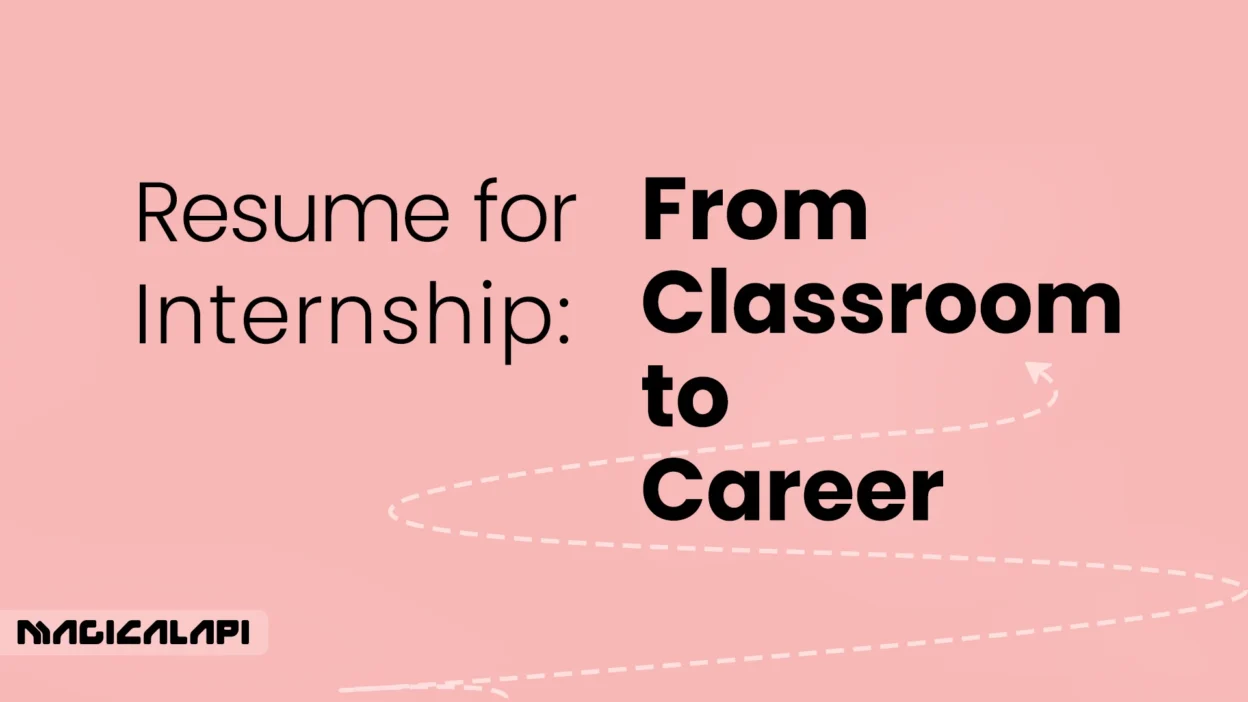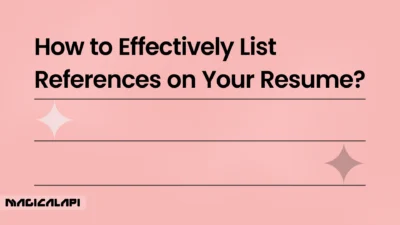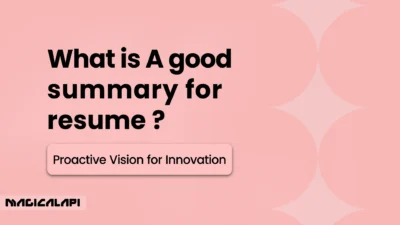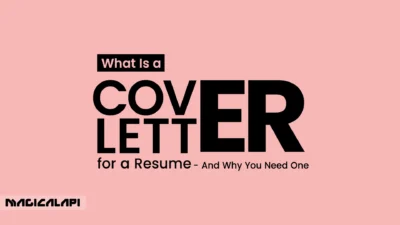Internships are such a great bridge from being a student to a pro. As a student in need of that initial flavor of the real world or changing careers to something different, having a knockout resume for the chance to apply for an internship can be the whole difference. In this article, you will discover that for a resume for internship no experience is needed. You will find out how to create an internship resume that brings out the best in your skills despite having no experience. So, join us, and let us begin learning and achieve that wow resume!
Table of Contents
Key Elements for an Internship Resume
A standout internship resume makes the most of what you’ve done so far, classes, projects, campus roles, even part‑time jobs, to show employers why you’re worth a shot. Because internships are entry-level, the document should convey eagerness to grow as much as existing knowledge. Here’s a fresh way to structure it:
1. Contact Details
Your name in bold, followed by phone, email, and, if it looks polished, your LinkedIn URL.
Think of this strip at the top of the page as a digital business card. Make it easy for a recruiter to reach you, even on a phone screen:
| Element | Tips | Example |
|---|---|---|
| Name | 2–4 pt larger than body text; bold; no nicknames unless that’s how you publish work. | Alexandra “Alex” Nguyen |
| Phone | Use a number you’ll always answer professionally; add your international code if applying abroad. | +49 151 23456789 |
| The school address is fine, but a clean personal Gmail looks more permanent. Avoid novelty domains. | [email protected] | |
| LinkedIn (or personal site) | Only include if fully populated and error‑free. Customise the public URL. | linkedin.com/in/alex‑nguyen |
| Location (optional) | City + state/country is enough. Skip full street address unless requested. | Berlin, Germany |
2. Objective or Summary (optional)
One or two crisp lines that link your career ambitions to the internship’s focus. Mention a couple of skills or experiences that match the posting.
1‑2 sentences, ~35–45 words total, that answer “Why you + why this role”.
Formula: “As a [year in school] in [field of study], I aim to [action verb] [employer’s goal] by leveraging [1–2 key skills], while expanding my expertise in [area the internship teaches].”
Example variations
| Field | Tailored objective |
|---|---|
| Software Engineering | “Third‑year computer‑science student seeking to boost Acme’s backend reliability by applying my Java/Spring and AWS experience; eager to deepen knowledge of distributed systems in a production environment.” |
| Marketing | “Business junior passionate about digital storytelling, ready to grow Ginkgo’s brand presence by pairing data‑driven SEO insights with hands‑on content creation.” |
| Finance | “Analytical economics sophomore looking to support Strato Capital’s equity research team with advanced Excel modeling and coursework in securities analysis, while sharpening valuation skills.” |
3. Education
Degree, major, school, and expected graduation.
- Add coursework, a GPA above 3.5, plus honors or dean’s list entries that back up your academic strength.
4. Skills
Split into two short lists:
- Technical: coding languages, software suites, lab methods, etc.
- Interpersonal: collaboration, public speaking, time management, leadership, problem‑solving.
A sharp skills section does two things at once: it signals the exact tools you can wield today and hints at how quickly you’ll master new ones tomorrow. Organize it so recruiters can skim in seconds yet leave with a clear picture of your technical horsepower and people‑savvy.
| Category | What to Include | Pro Tips |
|---|---|---|
| Technical Skills | • Programming languages (e.g., Python | Java |
| Interpersonal & Leadership Skills | • Collaboration & cross‑functional teamwork • Public speaking & presentation design • Agile or Scrum facilitation • Time‑boxing & prioritization • Conflict resolution & feedback delivery | • Show evidence elsewhere (“Presented findings to 50 peers…”). • Avoid buzzwords without proof. • Highlight any certifications (e.g., Toastmasters, PMI‑CAPM). |
5. Experience
No full‑time history yet? Use class projects, volunteer stints, student‑group roles, freelancing, anything that shows initiative. Even if every role you’ve held was unpaid or part‑time, frame each one like a mini‑case study that proves you can solve problems. For each entry:
- Organization, your role, and dates.
- Bullet points that start with action verbs and, whenever you can, include numbers (e.g., “co‑led a team of 4,” “reduced data‑entry time by 20%”).
6. Projects & Achievements
Spotlight course capstones, hackathon entries, designs, research posters, especially those tied to the field you’re targeting. List awards, scholarships, or special recognition. Treat this section as a highlight reel that connects directly to the internship’s domain. Aim for 2–4 projects max; link out (GitHub, Behance, Kaggle) when a reviewer wants to dive deeper.
7. Extras (optional)
Languages: note fluency level.
- Certifications: software badges, Google Analytics, CPR—anything that makes sense for the role.
- Interests: unique hobbies that can spark conversation or resonate with the company culture.
Formatting Pointers
- Keep to one page if you’re early in your career.
- Use a clean professional typeface sized 10–12 pt.
- Lean on clear section headings and bullet points for scannability.
- Proofread—typos are résumé kryptonite.
- Tweak the document for each application, moving the most relevant items to the top of each section.
Internship Resume Template (Text Format)
It is essential to have a professional and clean format when making a good resume. The following resume template for internship can be tailored:
[Your Name] [Your Address] [City, State, ZIP Code] [Phone Number] [Email Address] [LinkedIn Profile] (optional)
Objective Brief purpose statement for the internship and what you want to receive from the firm. For example: “Committed university student with strong academic background in [your area of study] seeking internship position at [firm name] in an attempt to implement theoretical knowledge and aid team success.”
Education
- [Degree Title], [Your Major]
- [University Name], [City, State]
- Expected Graduation: [Month, Year]
- Relevant Coursework: [List key courses related to the internship field]
Experience (If any; otherwise, include volunteer work or projects)
- [Job Title], [Company Name], [City, State]
Dates of Employment (Month, Year – Month, Year)
- Key responsibility or achievement #1
- Key responsibility or achievement #2
- Key responsibility or achievement #1
Skills
- Technical skills (e.g., software, tools, programming languages)
- Soft skills (e.g., communication, teamwork, problem-solving)
Projects
- Project Title: [Brief description, including your role and the outcome]
Volunteer Work
- [Volunteer Role], [Organization Name]
Dates of Involvement (Month, Year – Month, Year)
- Describe your responsibilities and achievements.
- Describe your responsibilities and achievements.
Awards and Achievements (optional)
- [Award Name] – [Brief description]
How Do I Write a Good Resume for an Internship?
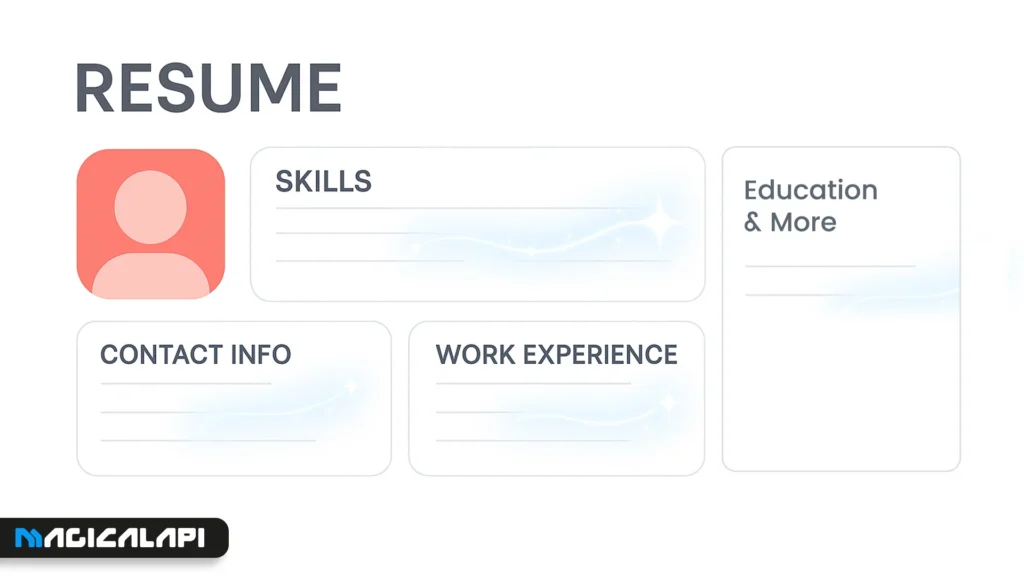
Building a strong internship resume begins with mastering the fundamentals. Take the following most crucial tips into consideration:
1. Build an Effective Objective Statement
Your goal should be clear, brief, and internship-oriented. Avoid overused phrases like “I want to gain experience.” Instead, highlight what you can contribute to the organization.
For example, rather than saying, “Looking for an internship to learn,” say something more assertive:
“Inspired marketing student with a flair for creative campaigns, eager to join [Company Name]’s digital marketing division through experience gained in social media planning and content development.”
2. Highlight Relevant Coursework
If you are a college student who is writing a resume for internship, there is something that can fill the gap of professional experience: your coursework! Name the courses that align with the skills or knowledge required for the role. For example, if you’re applying for an engineering internship, list courses like “Thermodynamics,” “Fluid Mechanics,” or “CAD Design.”
This indicates to the employer that you have at least enough knowledge to perform effectively in the position, even when you are short of actual experience.
3. Include Extracurricular Activities and Projects
Extracurricular projects and activities are a goldmine of transferable skills. Projects or activities like student organizations, leadership roles, or academic projects demonstrate teamwork, problem-solving, and leadership skills.
For example, if you were part of a robotics club and took the initiative to construct a working model, mention that in your resume. Specify how you contributed to the project and what the success of the project was. Initiative and dedication are qualities employers would like to hear about.
For checking your resume, and ats friendly check Resume Checker page.
Magical Resume Checker
Discover the full potential of the Magical Resume Checker and explore the various options available to enhance your resume, optimize it for applicant tracking systems (ATS), and improve your chances of landing your dream job.
4. Emphasize Skills Over Experience
If you’re writing a resume for internship with no experience, highlight your skills. Soft skills like communication, adaptability, and time management are occasionally just as crucial as technical skills. Highlight any technical tools, software, or languages you have experience with, like Adobe Creative Suite, Python, or Excel.
Sometimes, even your phone apps can help you out. For example, if you want to apply for a social media admin position, knowing apps like Inshot or CapCut can get you the job.
A few more examples to give you an idea:
- Technical Skills: Microsoft Office Suite, Google Analytics, Canva
- Soft Skills: Team-working, creative thinking, effective communication
5. Tailor Your Resume for Each Application
A one-size-fits-all resume is never effective. Look up the company and make your resume align with the company’s values, objectives, and the specific needs of the internship. That involves rewriting your objective statement, restructuring skills and experiences to prioritize relevance, and even tweaking wording to incorporate the company’s terminology.
6. Use Action Verbs and Quantifiable Results
Wherever possible, use action verbs like “led,” “designed,” “organized,” or “developed.” These words have a greater impact. In case you have quantifiable achievements, like “Increased social media engagement by 30%, do so. Numbers are emphasized and help to prove your claim.
Read More: How to write a job description for a resume?
Internship Resume Examples
Here are two examples of resumes tailored for different fields:
Example 1: Marketing Intern Resume for Internship
[Your Name] [Your Address] | [Phone Number] | [Email Address] | [LinkedIn Profile]
About me: Motivated marketing student passionate about brand storytelling and consumer engagement. Seeking a summer internship at [Company Name] to apply my knowledge of digital marketing strategies and contribute to creative campaigns.
Education
- Bachelor of Science in Marketing
[University Name], [City, State]
Expected Graduation: [Month, Year]
Relevant Coursework: Digital Marketing, Consumer Behavior, Market Research
Projects
- Social Media Campaign for Local Business: Designed a 3-month campaign, increasing online engagement by 25%.
Skills
- Adobe Creative Suite (Photoshop, Illustrator)
- Social Media Platforms (Instagram, Twitter, LinkedIn)
- Analytical Tools (Google Analytics, Hootsuite)
- Strong written and verbal communication
Example 2: Engineering Intern Resume for Internship
[Your Name] [Your Address] | [Phone Number] | [Email Address] | [LinkedIn Profile]
Objective: Detail-oriented engineering student eager to contribute to innovative projects. Seeking an internship at [Company Name] to apply theoretical knowledge of mechanical systems and learn from industry professionals.
Education
- Bachelor of Science in Mechanical Engineering
[University Name], [City, State]
Expected Graduation: [Month, Year]
Relevant Coursework: Thermodynamics, Fluid Mechanics, CAD Design
Projects
- Wind Turbine Design: Led a team to create a functional prototype, improving energy efficiency by 15%.
Skills
- CAD Software (AutoCAD, SolidWorks)
- Programming (MATLAB, Python)
- Problem-solving and analytical thinking
Adding Personal Branding to Your Internship Resume
Personal branding features can help your resume stand out. This could be a link to your portfolio, a professional blog, or even a curated LinkedIn profile. You can show your unique perspective and projects, and potential employers gain insight into your capabilities and interests.
For example, if you come from a design background and have a portfolio displaying design projects or a GitHub account containing code samples, include the link in the contact section. It further validates your skills but also makes it seem like you’re taking the initiative.
The Importance of Soft Skills in Your Resume
While technical skills matter for Resume for Internship to an internship, soft skills matter a lot, too. Employers appreciate skills such as communication, adaptability, and teamwork.
Indicate particular projects or times you have shown these skills. For example:
- Successfully managed a team project among 5 people, assigning tasks to meet deadlines.
- Adapted to new software tools in a short timeframe, enhancing project efficiency by 20%.
These examples serve as proof of your capabilities and demonstrate you’re ready to step into the workplace.
Magical Resume Score
Discover everything you need to know about Magical Resume Score , how it evaluates your resume, and the various options available to enhance your job application and improve your chances of success.
Common Mistakes to Avoid
No matter how good a resume is, it would carry no weight if it is not free of mistakes that can be avoided. Easy mistakes can leave you looking unprofessional or unprepared, and may have you losing out on a fantastic opportunity. To help you avoid the pitfalls that could keep your resume from rising to the top of the pile for all the right reasons, here are some common mistakes to look out for and how to remedy them:
- Typos and Grammatical Errors: Make sure you proofread your resume a couple of times to fix any errors.
- Unnecessary New Information: You want to stick to what is directly relevant to the internship in question.
- Using an Unprofessional Email Address: Stick to a simple email format [[email protected]]. Make sure your email looks professional
- Not Customizing Your Resume: You are less likely to get the employer’s attention with a generic resume.
With these tips and examples in Magical API, you will have everything you need to take your resume from the classroom to a career.
Conclusion For Resume for Internship
Writing a resume for an internship is a delicate balance between reflecting your unique qualifications, customizing your application to the job in question, and formatting your information in an easy-to-read manner. Your resume (resume) is the first impression a potential employer will have, so make it count! With the tips, templates, and examples in this guide, you can confidently create a resume that commands attention.
Whether you’re a college student or an individual with no previous experience, the important thing is that you highlight your strengths, showcase your potential, and demonstrate your willingness to learn.
Good luck with your applications for internships! It could be a stepping stone to an exciting career, and your first-class CV should put you on the road to success.
FAQs About Resume for Internship
How Long Should My Resume Be?
For a college student resume for internship, keep it to one page. Employers prefer concise resumes that are easy to skim. However, make sure it’s comprehensive enough to showcase your skills and achievements.
What If I Have No Experience?
Focus on your education, skills, and projects. Include volunteer work, extracurricular activities, or anything that demonstrates relevant abilities. Highlighting your willingness to learn and adapt can also make a strong impression.
Can I Include High School Information?
If you’re a freshman or sophomore in college with limited experience, including high school achievements, can be helpful. Otherwise, prioritize recent and relevant information.
Do I Need a Cover Letter?
Yes, a cover letter is often required and complements your resume by explaining why you’re interested in the internship and what you bring to the table. A well-written cover letter can significantly boost your chances of securing an interview.
How Do I Customize My Resume for Each Internship?
Research the company’s values and the internship’s requirements. Highlight the most relevant skills, experiences, or coursework that align with their needs. Customizing your resume demonstrates genuine interest and effort.


